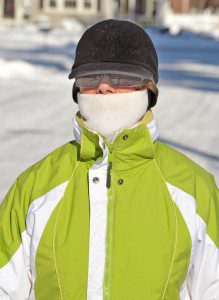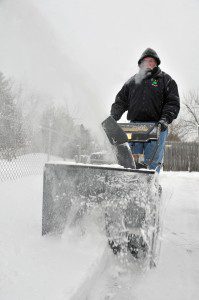
Terry Busiere, of Westfield, attempts to stay warm during her daily one-hour walk around the Western Avenue section of the city Friday. (Photo by Frederick Gore)
WESTFIELD – As the New Year Nor’Easter passed us by, many city residents stoked their fires, turned up the thermostat, and nestled in for a long winter’s nap last night.
A wind chill warning was in effect until early this morning, and the temperature was set to dip well below zero during the evening hours for the rest of the weekend, putting all who are exposed to elements at risk.
“As we enter the time of year when we can expect extremely low temperatures and wind chills, we all must take precautions to minimize the dangers presented by such severe weather,” said Massachusetts Emergency Management Agency (MEMA) Director Kurt Schwartz.
According to MEMA, excessive exposure to extreme temperatures can lead to frostbite, a condition which damages body tissue that is frozen. Frostbite causes a loss of feeling and a pale appearance in extremities, such as fingers, toes, earlobes or the tip of the nose. If symptoms are detected, seek medical help immediately.
In extreme cases, hypothermia can also occur. Warning signs for this condition are uncontrollable shivering, memory loss, disorientation, incoherence, slurred speech, drowsiness and apparent exhaustion.

A white vapor cloud of condensation from the breath of James Fahey, of Southwick, can be seen as he snowblows his driveway Friday morning. Frigid temperatures moved into the area Thursday as the snow arrived. (Photo by Frederick Gore)
MEMA also advises that if a person’s temperature drops below 95 degrees, they must seek immediate medical care.
The organization is also informing residents to monitor local weather reports, keep outdoor activities to minimum, to keep a well-stocked Winter Home Emergency Supply Kit with flashlights, a portable radio, extra batteries, a first aid kit, bottled water, non-perishable food items, and a manual can opener.
The Red Cross of Greater Westfield is on stand-by, waiting to assist and support any “warming shelters” that may be erected.
“We’re working with city officials and emergency management workers to provide food and shelter as needed,” said Dawn Leaks, spokesperson for the Red Cross. “While the cold forecast for us will be short in duration this time, it is the first arctic blast of the season and it will be extremely cold. It’s good to reacquaint yourself with some cold weather tips to get you through the season safely.”
Leaks said that clothing is of the utmost importance in these conditions, and advises that residents dress in layers, as well as mittens and hats.
“Most of your body heat is lost through your head, so wear a hat, preferably one that covers your ears,” Leaks said. “You can remove layers as needed if you become too warm. Mittens provide more warmth to your hands than gloves.”
Leaks also advises the wearing of waterproof, insulated boots to help “avoid hypothermia or frostbite by keeping your feet warm and dry and to maintain your footing in ice and snow.”
“Get out of wet clothes immediately, and warm the core body temperature with a blanket or warm fluids like hot cider or soup,” she said. “Avoid drinking caffeine or alcohol if you expect you or someone you are trying to help has hypothermia or frostbite.”
Sufficient heating fuel, as well as emergency heating equipment in case of lost electricity, are also atop the Red Cross’ list of priorities residents should be considering. Westfield Gas and Electric is looking to keep city residents comfy and cozy this weekend.
“It’s been status quo thus far,” said G&E Energy Specialist Sean Fitzgerald Friday afternoon. “As far as outages, it’s been business as usual.”
While there haven’t been any significant losses of power in the city so far during this first storm, Fitzgerald said the company has an emergency incident control plan in place with which to mobilize workers and to get the power back on.
He said the company has also taken numerous precautions to reduce the chances of outages.
“We did a lot of tree trimming (the past few months) to make sure our wires are clear debris,” Fitzgerald said, adding that it’s something the company has taken much more seriously since the city’s great ice storm of 2011.
The G&E’s biggest concern at the moment is home ventilation, for as these cold temperatures bring an increase in gas usage, keeping the heat inside and the toxic fumes outside of the house is of the utmost importance.
“Colder temperatures mean people will be consuming gas for their furnaces,” Fitzgerald said. “And if there is snow build-up against the vents, that carbon monoxide stays inside the home, so it’s important to keep the vents shovelled and clear.”
Fitzgerald added that maintaining consistant heat, “not cranking it too high or too low”, is key to being warm and safe this winter, and that, for a charge, G&E technicians can visit your home and work on fixing any problems you may encounter.
“Our dispatch center is always available,” he said.
Regarding home power outages, the Red Cross also advised not to use candles for lighting and advocated using flashlights only.
According to the National Fire Prevention Association, heating equipment is the leading cause of home fires during the winter months, with about two-thirds of home heating fire deaths caused by portable or fixed space heaters.
To prevent fire, Leaks says to place space heaters at least three feet away from anything combustible, such as wallpaper, bedding, clothing, pets and people.
“Never leave space heaters operating when you are not in the room or when you go to bed, and don’t leave children or pets unattended near space heaters,” she said.
A Red Cross safety checklist also lists drying wet mittens or other clothing over space heaters is a fire hazard.
If you use a portable generator during a power outage, the Red Cross advises to always operate the generator outdoors and never inside of a basement or garage, as well as not to connect a generator directly to your home’s wiring – leave that work to a professional electrician.
“The safest thing to do is to connect the equipment you want to power directly to the outlets on the generator,” Leaks said.
Connecting a cord from the generator to a point on the permanent wiring system and back-feeding power to your home is an unsafe method to supply a building with power, she added.
The Red Cross also warns against overloading electrical outlets, and to be careful of extension cords that present hazardous walkways.
The organization is also a proponent of having chimney connections and flues cleaned and inspected by a professional prior to the start of every heating season.
Regarding fire safety, a fireplace screen is recommended when burning fires, as well as the burning of only wood, never burn paper or items like pine boughs.
Another common winter hazard are frozen pipes, which the Red Cross says can be avoided with proper precautions.
“Many homeowners may not be ready for frigid weather. Now is the time to protect your house pipes from freezing and bursting,” Leaks said. “With the cold weather upon us, preventive action may make all the difference.”
The Red Cross advises keeping garage doors closed if there are water supply lines in the garage or in walls adjacent to it, as well as opening kitchen and bathroom cabinet doors to allow warmer air to circulate around your plumbing.
Letting the cold water drip from faucets served by exposed pipes or pipes in exterior walls is also a good idea during sub-zero temperatures.
“Running water through the pipe – even at a trickle – helps prevent pipes from freezing because the temperature of the water running through it is above freezing,” according to the Red Cross checklist.
Leaks also advocated keeping the thermostat in your home set to the same temperature both during the day and at night is also a smart play.
“By temporarily suspending the use of lower nighttime temperatures, you may incur a higher heating bill, but you can prevent a much more costly repair job if pipes freeze and burst,” she said.
They also advise, if you will be going away during cold weather, to leave the heat on in your home, set to a temperature no lower than 55 degrees farenheit.

